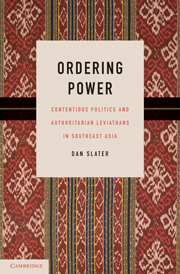Book contents
- Frontmatter
- Contents
- Map, Tables, and Figures
- Acknowledgments
- Map Contemporary Southeast Asia
- Part I The Puzzles and Arguments
- 1 To Extract and To Organize
- 2 States and the Regimes That Run Them
- Part II Contentious Politics And The Institutions Of Order
- Part III The Foundations and Fates of Authoritarian Leviathans
- Part IV Extending the Arguments
- Bibliography
- Index
1 - To Extract and To Organize
Published online by Cambridge University Press: 05 June 2012
- Frontmatter
- Contents
- Map, Tables, and Figures
- Acknowledgments
- Map Contemporary Southeast Asia
- Part I The Puzzles and Arguments
- 1 To Extract and To Organize
- 2 States and the Regimes That Run Them
- Part II Contentious Politics And The Institutions Of Order
- Part III The Foundations and Fates of Authoritarian Leviathans
- Part IV Extending the Arguments
- Bibliography
- Index
Summary
The Outcomes in Question: Ineffective States and Undemocratic Regimes
In framing a government which is to be administered by men over men, the great difficulty lies in this: you must first enable the government to control the governed; and in the next place oblige it to control itself.
James MadisonThe postcolonial world is riddled with governments that must reflect Madison's worst political nightmare: They are neither enabled to control society nor obliged to control themselves. Half a century after the global struggle for decolonization reached its 1960 pinnacle, effective and democratic public authority remains a rare political commodity throughout Asia, Africa, Latin America, and the Middle East.
Yet the overarching pattern of postcolonial politics has not been one of extreme failure, but of extreme variation. The powerful “developmental states” of East Asia offer a stark contrast to the “predatory states” of sub-Saharan Africa and the numerous “intermediate states” in between. Still, most postcolonial states sorely lack what Michael Mann calls “infrastructural power,” or the institutional capacity to implement their political objectives. Most notably, precious few states in the developing world manage to mobilize significant revenue through income or corporate taxes on economic elites, who hold a grossly disproportionate share of wealth in developing economies. Incapable of sustainably funding themselves, such states have also proven incapable of performing virtually every virtuous task that modern states ostensibly exist to fulfill. In many cases, postcolonial Leviathans have even failed to develop and coordinate the kind of coercive apparatus necessary to lay effective claim to what Max Weber considered the defining trait of stateness – a “monopoly of the legitimate use of physical force within a given territory.”
- Type
- Chapter
- Information
- Ordering PowerContentious Politics and Authoritarian Leviathans in Southeast Asia, pp. 3 - 32Publisher: Cambridge University PressPrint publication year: 2010



